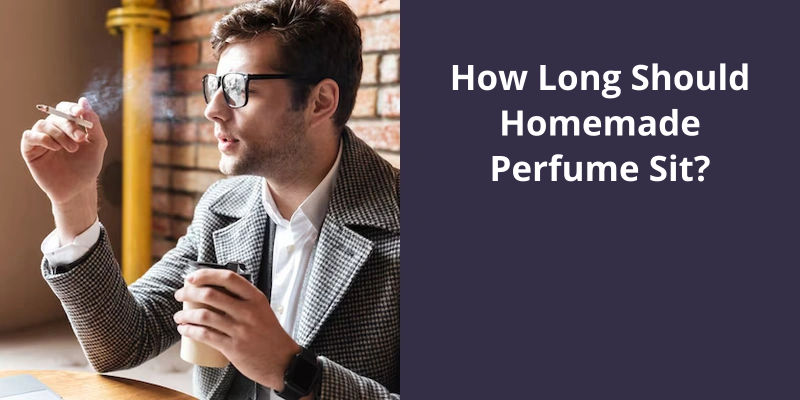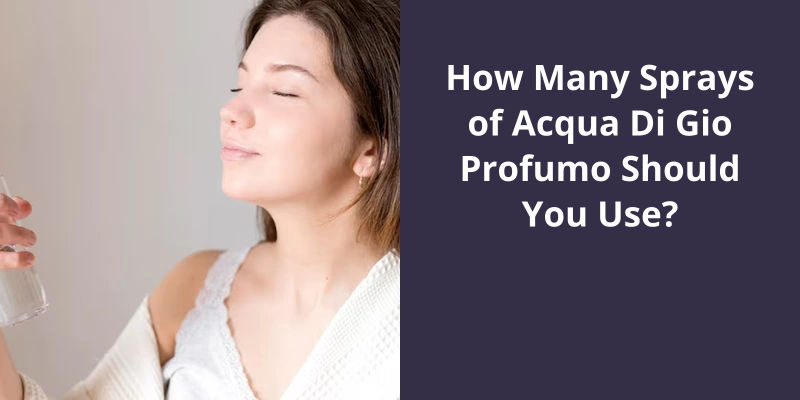Homemade perfume should sit for a minimum of 48 hours to six weeks. The resting period, often called the maturation period, allows for the various scents to meld together, creating a unique, complex fragrance. The longer the perfume sits, the stronger and more well-rounded the scent becomes. Hence, a period of two days is sufficient if you’re in a rush, but if you’re after a deep, rich scent, it’s best to leave your homemade perfume to mature for several weeks. Remember to store it in a cool, dark place during this period for optimal results.

How Long Does It Take to Make Homemade Perfume?
When making homemade perfume, the process can be quite simple and quick. One popular DIY perfume recipe uses essential oils and carrier oils. To start, pour your chosen carrier oil into a glass bottle. This will serve as the base for your perfume. Next, add your desired scent notes – base, middle, and top notes. These can come from a variety of essential oils, allowing you to create a unique fragrance. Once the oils are added, it’s important to add some alcohol to help blend the scents together. This alcohol acts as a preservative and helps the perfume last longer. Once all the ingredients are in the bottle, securely close the lid and let the perfume sit for 48 hours. This allows the scents to mingle and develop into a well-balanced fragrance.
During this 48-hour period, it’s best to keep your perfume in a cool, dark place. This will help to preserve the fragrance and prevent any degradation. After the 48 hours have passed, your homemade perfume should be ready to use. You can now transfer it to a spray bottle or keep it in the glass bottle for use with a dropper. It’s important to note that homemade perfumes made with essential oils may not have the same staying power as commercial perfumes. However, they can still provide a lovely, natural scent that you can customize to your liking. Experiment with different essential oil combinations and ratios to find your perfect homemade perfume.
Using essential oils and a carrier oil as a base, you can create a unique fragrance that suits your preferences. The 48-hour sitting period allows the scents to blend together and develop into a harmonious perfume. So go ahead and create your own signature fragrance at home!
The Benefits of Making Homemade Perfume
- Customization based on personal preferences
- Use of natural ingredients
- Avoidance of harmful chemicals
- Cost-effective compared to store-bought perfumes
- Potential health benefits from essential oils
- Opportunity for creativity and self-expression
- Avoidance of animal testing and cruelty-free options
- Enhancement of mood and well-being through personalized scents
- Control over the intensity and longevity of the fragrance
- Possibility of creating unique and one-of-a-kind perfumes
Now that we understand the importance of allowing perfume oils to rest, let’s explore some tips on how to maximize their scent and longevity.
How Long Should You Let a Perfume Oil Sit?
The duration for which homemade perfume should sit before it reaches it’s optimal state varies depending on several factors. One prominent factor is the seasonal conditions during transit, particularly in extremely hot or cold weather. In such cases, the perfume oil might experience temperature fluctuations for an extended period, which can temporarily impact it’s fragrance. To counteract this, it’s advisable to let your perfumes rest within the confines of your home for a minimum of 24 to 48 hours. This resting period allows the perfume to stabilize and fully unveil it’s true scent.
During the resting period, the perfume undergoes a maturation process, during which it’s various components harmonize and blend together. This maturation period is crucial for the perfume to achieve it’s desired balance and complexity. Skipping this rest period might result in a fragrance that lacks depth and character, and may not accurately represent the intended scent profile.
This resting period enables the fragrance to evolve as the top, middle, and base notes interact and meld together. The top notes, typically the most volatile, may dissipate during transit due to environmental conditions. Allowing the perfume to sit ensures that these top notes have a chance to re-establish themselves and contribute to the overall fragrance.
The various essential oils, synthetic fragrances, and carrier oils in the perfume have different molecular compositions. Allowing them time to interact and react with one another can result in a more cohesive and enjoyable final product.
Some perfumes may require a shorter rest period, while others may benefit from a longer one. Experimentation and an understanding of how different ingredients interact will help you determine the optimum resting time for your homemade perfume.
Factors That Affect the Resting Period of Perfume Oils, Such as Temperature and Humidity
- Temperature fluctuations
- Humidity levels
- Exposure to sunlight
- Air circulation
- Quality of the perfume oil
- Storage conditions
- Type of container
Watch this video on YouTube:
As you indulge in the luxurious allure of a new fragrance, you may wonder if there’s more to it than meets the nose. Does perfume need to settle? Patience is indeed a virtue when it comes to experiencing perfume at it’s finest. When first applied, the initial burst of the top notes may deceive you, as they tend to be alcoholic and fleeting. However, by allowing the perfume to settle, it’s true essence will gradually emerge, offering a captivating scent that lingers on your skin.
Does Perfume Need to Settle?
Perfume enthusiasts often wonder about the appropriate amount of time to let their homemade fragrance sit before using it. This consideration is crucial because, like fine wine, perfumes may need time to settle in order to unlock their full potential. While it’s tempting to immediately indulge in the aromatic concoction, it’s important to exercise patience and allow the perfume to settle.
When homemade perfumes are initially sprayed, it’s the top notes that are most prominent. These top notes are often composed of high concentrations of alcohol, which tends to evaporate quickly. This rapid evaporation creates an initial burst of scent that may be deceiving. Many individuals make the mistake of judging the fragrance solely on these fleeting top notes, missing out on the true essence of the perfume that awaits them.
By letting the perfume settle, the base notes are given the opportunity to unfold and reveal their true character. Unlike the top notes, the base notes are more stable and linger on the skin for much longer. This is where the depth and complexity of the fragrance lie. Allowing the perfume to rest allows these base notes to fully integrate with each other, ultimately creating a harmonious and well-rounded scent.
During the settling period, it’s important to store the perfume in a cool, dark place away from direct sunlight and excessive heat. This will help preserve the delicate balance of the fragrance and prevent any degradation caused by external factors. Additionally, occasional gentle shaking of the perfume bottle can aid in the integration of the ingredients but should be done sparingly to avoid unnecessary agitation.
How to Properly Store Perfume During the Settling Period.
- Store perfume in a cool, dark place to prevent exposure to light and heat.
- Avoid storing perfume near windows or areas with direct sunlight.
- Keep perfume bottles tightly sealed to prevent evaporation and maintain the fragrance.
- Store perfumes away from sources of humidity, such as bathrooms or kitchens.
- Avoid storing perfume bottles in areas with fluctuating temperatures.
- Ensure that the perfume is stored upright to prevent any leakage or spills.
- Consider using a perfume storage box or bag to protect bottles from potential damage.
- Don’t store perfumes next to strong-smelling products, as they can alter the scent.
- Check the expiry date of perfumes and discard any that have passed their shelf life.
- Take extra care when traveling to prevent perfume bottles from breaking or getting damaged.
The settling process of perfume differs depending on it’s oil concentration and formulation. In general, it takes around 15 minutes for the fragrance to fully settle and for different notes, particularly the middle notes, to become noticeable. This period allows the scent to blend with your body chemistry, revealing it’s full aromatic potential.
How Long Does It Take for Perfume to Settle?
The process of settling or maturing of a homemade perfume largely depends on it’s oil concentration and the specific blend of ingredients used. Generally, perfumes with higher oil concentrations tend to take longer to settle down and fully develop their aromatic profile. For instance, if your homemade perfume contains approximately 30-35% oil concentration, you can expect it to take around 15 minutes before the fragrance begins to transform.
During those initial 15 minutes, the top notes of the perfume, which are the most volatile and evaporate quickly, will start to fade away, allowing the middle notes to come forward. These middle notes, also known as the heart notes, are the core of the perfumes composition and tend to be more long-lasting. Once the top notes have dissipated, you may begin to notice a shift in the fragrances scent as the middle notes take center stage.
The scent may evolve further, revealing the base notes, which are typically the heaviest and most long-lasting components of the perfume. This entire process can be quite captivating, as the fragrance continues to transform on your skin over time.
The Importance of Allowing Perfume to Settle Before Making a Final Judgment on It’s Scent.
It’s important to allow homemade perfume to sit and settle before making a final judgment on it’s scent. This is because the scent of perfume can change and develop over time as the ingredients blend and interact with each other. Allowing the perfume to sit for a few days or even weeks can result in a more accurate representation of it’s true scent. The settling process allows the different notes in the perfume to harmonize and mellow out, creating a more balanced and enjoyable fragrance. Rushing the judgment of a perfume’s scent immediately after creation may lead to inaccurate perceptions and missed potential. So, be patient and give your homemade perfume the time it needs to fully develop before making a final assessment.
Perfume enthusiasts have long debated the impact of alcohol on fragrance longevity, but the truth is that alcohol-free alternatives can be just as durable, if not more so. By avoiding the fast evaporation associated with alcohol-based perfumes, these alcohol-free options have the potential to linger on the skin for an impressive duration. Additionally, their subtle application ensures a more understated and long-lasting scent experience. In fact, some non-alcohol-based perfumes defy expectations by lasting an impressive 12 to 24 hours.
Does Perfume Without Alcohol Last Longer?
Does perfume without alcohol last longer? They also go on much more subtly. You’ll be surprised to know that some of these non-alcohol based perfumes last for as long as up to 12 to 24 hours. The absence of alcohol in these perfumes actually helps to enhance the longevity of the scent.
Unlike alcohol-based perfumes that tend to evaporate quickly, alcohol-free perfumes are designed to have a slower rate of evaporation. This means that the scent molecules in the perfume are released more gradually, resulting in a longer-lasting fragrance.
However, it’s important to note that the longevity of a perfume ultimately depends on several factors, including the specific fragrance notes, the individuals body chemistry, and the application technique. While alcohol-free perfumes may generally last longer, it’s still recommended to test a perfume on your skin before purchasing to ensure that it reacts well with your body chemistry and achieves the desired longevity.
Factors That Affect the Longevity of Perfume
Several factors can influence the longevity of homemade perfume. The strength of the fragrance materials used, such as essential oils or fragrance oils, will impact how long the scent lingers on the skin. Perfumes with a higher concentration of oils tend to last longer compared to those with lower concentrations.
The composition of the perfume can also affect it’s longevity. The inclusion of fixatives, which are ingredients that stabilize and extend the fragrance, can help the scent last longer. Common fixatives include ingredients like ambergris, musk, or benzoin.
Additionally, the quality of the base materials used in the perfume formulation can play a role. Using high-quality carrier oils and alcohol can contribute to the longevity of the scent.
Proper aging or resting of homemade perfumes is another factor to consider. Allowing the perfume to sit for a certain period of time can help the fragrance mature and blend together, enhancing it’s longevity. The recommended resting time for homemade perfumes can vary, but it’s generally suggested to let them sit for at least a few weeks to a few months to achieve optimal results.
Ultimately, the longevity of homemade perfume is influenced by a combination of factors, including the concentration of fragrance materials, the presence of fixatives, the quality of the base ingredients, and the resting period of the perfume.
Conclusion
Once the desired scent is achieved, the addition of filtered water and a thorough shake will ensure the final product is well-mixed. Finally, using a coffee filter to transfer the liquid to the designated bottle will help remove any impurities and guarantee a high-quality homemade perfume. The result will be a unique and personalized fragrance that rivals commercial options.





